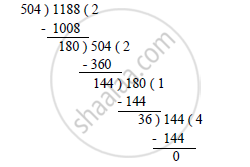Advertisements
Advertisements
Question
Using Euclid’s algorithm, find the HCF of 504 and 1188 .
Solution

On applying Euclid’s algorithm, i.e. dividing 1188 by 504, we get:
Quotient = 2, Remainder = 180
∴ 1188 = 504 × 2 + 180
Again on applying Euclid’s algorithm, i.e. dividing 504 by 180, we get:
Quotient = 2, Remainder = 144
∴ 504 = 180 × 2 + 144
Again on applying Euclid’s algorithm, i.e. dividing 180 by 144, we get:
Quotient = 1, Remainder = 36
∴ 180 = 144 × 1 + 36
Again on applying Euclid’s algorithm, i.e. dividing 144 by 36, we get:
∴ 144 = 36 × 4 + 0
Hence, the HCF of 1188 and 504 is 36.
APPEARS IN
RELATED QUESTIONS
Show that any positive odd integer is of the form 4q + 1 or 4q + 3, where q is some integer.
Find the HCF of the following pairs of integers and express it as a linear combination of 1288 and 575.
Using prime factorization, find the HCF and LCM of 96, 404 In case verify that HCF × LCM = product of given numbers.
Using prime factorization, find the HCF and LCM of 24, 36, 40 .
Find the least number which when divides 35, 56 and 91 leaves the same remainder 7 in each case.
Three measuring rods are 64 cm, 80 cm and 96 cm in length. Find the least length of cloth that can be measured an exact number of times, using any of the rods.
Without actual division, show that each of the following rational numbers is a terminating decimal. Express each in decimal form.
(i) `151/600`
Express each of the following as a rational number in its simplest form:
(i) ` 0. bar(365)`
The number of decimal place after which the decimal expansion of the rational number \[\frac{23}{2^2 \times 5}\] will terminate, is
Which of the following rational numbers have terminating decimal?
